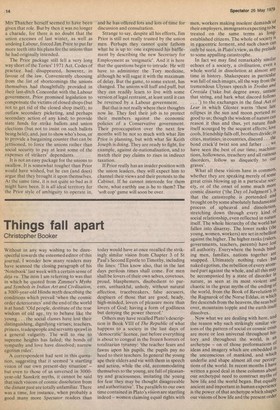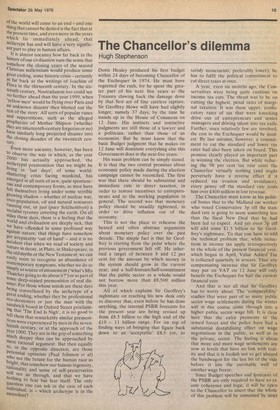Things fall apart
Christopher Booker
Without in any way wishing to be disrespectful towards the esteemed editor of this journal, I wonder how many readers may have scanned the closing paragraph of his 'Notebook' last week with a certain sense of deja vu. The item I am referring to was that in which he quoted from Zimmer's Myths and Symbols in Indian Art and Civilisation, a 3000-year-old Hindu myth describing the conditions which prevail 'when the cosmic order deteriorates' and the end of the world is at hand: 'Old people, destitute of the true wisdom of old age, try to behave like the young . . . the social classes have lost their distinguishing, dignifying virtues; teachers, princes, tradespeople and servants sprawl in a general vulgarity. The will to rise to supreme heights has failed; the bonds of sympathy and love have dissolved; narrow egotism rules'.
A correspondent had sent in this quotation, suggesting that it seemed 'a startling vision of our own present-day situation' — but even to those of us unversed in 3000year-old Sanskrit myths, it cannot be said that such visions of cosmic dissolution from the distant past are totally unfamiliar. There was a time, for instance, when probably a good many more Spectator readers than today would have at once recalled the strikingly similar vision from Chapter 3 of St Paul's Second Epistle to Timothy, including the lines: 'This know also, that in the last days perilous times shall come. For men shall be lovers of their own selves, covetous, proud, blasphemers, disobedient to parents, unthankful, unholy, without natural affection, trucebreakers, false accusers, despisers of those that are good, heady, high-minded, lovers of pleasure more than lovers of God; having a form of godliness but denying the power thereof.'
Others may have recalled Plato's description in Book VIII of The Republic of what happens to a society in the last days of 'democratic' licence, just before everything is about to congeal in the frozen horrors of totalitarian tyranny: 'the teacher fears and fawns upon his pupils, the pupils pay no heed to their teachers. In general the young ape their elders and vie with them in speech and action, while the old, accommodating themselves to the young, are full of pleasantry and graciousness, imitating the young for fear they may be thought disagreeable and authoritative'. The parallels to our own time contained in Plato's vision are startling indeed — women claiming equal rights with men, workers making insolent demands of their employers, immigrants expecting to be treated on the same terms as longestablished citizens. The whole of society is in egocentric ferment, and such chaos can only be seen, in Plato's view, as the prelude to some appalling catastrophe. In fact we may find remarkably similar echoes of a society, a civilisation, even a whole world in dissolution at almost any time in history. Shakespeare in particular was full of such images, all the way from the tremendous Ulysses speech in Troilus and Cressida ('take but degree away, untune that string, and hark what discord folloWs . . . ') to the exchanges in the final Act of Lear in which Gloster warns 'these late eclipses in the sun and moon portend n0 good to us; though the wisdom of nature can reason it thus and thus, yet nature finds itself scourged by the sequent effects; love cools, friendship falls off, brothers divide; in cities, mutinies; in countries, discord. . the bond crack'd twixt son and father . . • we have seen the best of our time; machinations, hollowness, treachery and all ruinous disorders, follow us disquietly to our graves'. What all these visions have in common, whether they are speaking merely of soMe great crisis blowing up in a particular society, or of the onset of some much more cosmic disaster (`the Day of Judgment), is that the catastrophe is portended and, brought on by some absolutely fundamental process of upheaval and dissolution, stretching down through every kind of social relationship, even reflected in nature itself. The whole hierarchy of the world has fallen into disarray. The lower ranks (the young, women, workers) are set in rebellion against the higher. The higher ranks (rulers, governments, teachers, parents) have lost all authority. Everywhere the bonds binding men, families, nations together are snapped. Ultimately nothing rules but naked egotism, the rebellion of every atornised part against the whole, and all this maY be accompanied by a state of disorder in nature, as seen at its most violent and chaotic in the great myths of the ending 91 the world, from the Book of Revelation i° the Ragnarok of the Norse Eddas, in which fire descends from the heavens, the seas boil over, mountains topple and the earth itself dissolves. Now what we are dealing with here, and the reason why such strikingly similar visions of the pattern of social or cosmic crisis are more or less universal throughout history and throughout the world, is an archetype — on of those preformations of ideas and imagery which are embedded in the unconscious of mankind, and which underlie and shape almost all our percer tions of the world. In recent months I have written a good deal in these columns about our archetypal need to construct myths of how life and the world began. But equallY ancient and important in human experience is the power of that archetype which shaPes our visions of how life and the present order of the world will come to an end — and one thing that cannot be denied is the fact that at the present time, and even more in the years Which lie immediately ahead, that archetype has and will have a very significant part to play in human affairs. It is almost uncanny how far back in the history of our civilisation runs the sense that somehow the closing years of the second Christian millennium would produce some great ending, some historic crisis — certainly as far back as the writings of Joachim of Flora in the thirteenth century. In the sixteenth century, Nostradamus too could see no further ahead than the year 1999, when 'yellow men' would be flying over Paris and an unknown disaster then blotted out the rest of the story. All sorts of popular runes and superstitions, such as the alleged Prophecies of Mother Shipton (whether they are nineteenth-century forgeries or no) have similarly long projected disaster into the closing decades of the twentieth cen tury.
Even more uncanny, however, has been to observe the way in which, as the year 2000 has actually approached, the archetypal premonition that we might be living in 'last days', of some worldshattering crisis facing mankind, has emerged in all sorts of new, quite spontaneous and contemporary forms, as men have felt themselves living under some terrible growing shadow — whether of nuclear war, over-Population, oil and natural resources running out, or just (pace Solzhenitsyn) a socialist tyranny covering the earth. On all Sides these days, there is a feeling that the world and civilisation are deeply sick, that We have offended in some profound way against nature, that things have somehow got .irreparably 'out of hand' — and it is no accident that when we read of society and nature in decay, in Plato, in Shakespeare, in the old myths or the New Testament, we can easily seem to recognise an abundance of contemporary symptoms, whether we do so simply as source of amusement ('what's Mrs Thatcher going to do about it?') or as part of some deep-seated premonition of real disaster. For those whose minds are these days being constellated by the archetype of a great ending, whether they be professional ecii-cloomsters or just the man with the Sandwich board in Oxford Street proclaiming that The End Is Nigh', it is no good to tell them that remarkably similar premoni tions were experienced by men in the seven teenth century, or at the approach of the Year 1000. They are in the grip of something much deeper than can be approached by mere rational argument. But then equally so, in the opposite direction, are those Perennial optimists (Paul Johnson et al) Who see the future for the human race as bright, that somehow our human ingenuity, rationality and sense of self-preservation Will see us through, and that we have nothing to fear but fear itself. The only 9uestion one can ask in the case of each individual, is — which archetype is in the ascendant?



































 Previous page
Previous page